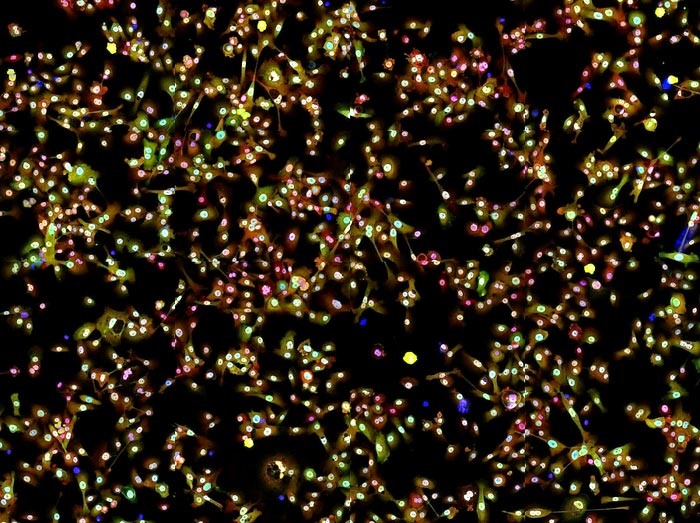New bacterial therapy approach to treat lung cancer

Fluorescence microscopy image of lung cancer cells stained with antibodies against proteins involved in cellular growth.
Credit: Dhruba Deb/Columbia Engineering
Columbia biomedical engineers develop therapeutic strategy to combine bacterial therapies with pharmaceutical drugs.
Lung cancer is the deadliest cancer in the United States and around the world. Many of the currently available therapies have been ineffective, leaving patients with very few options. A promising new strategy to treat cancer has been bacterial therapy, but while this treatment modality has quickly progressed from laboratory experiments to clinical trials in the last five years, the most effective treatment for certain types of cancers may be in combination with other drugs.
Columbia Engineering researchers report that they have developed a preclinical evaluation pipeline for characterization of bacterial therapies in lung cancer models. Their new study, published December 13, 2022, by Scientific Reports, combines bacterial therapies with other modalities of treatment to improve treatment efficacy without any additional toxicity. This new approach was able to rapidly characterize bacterial therapies and successfully integrate them with current targeted therapies for lung cancer.
“We envision a fast and selective expansion of our pipeline to improve treatment efficacy and safety for solid tumors,” said first author Dhruba Deb, an associate research scientist who studies the effect of bacterial toxins on lung cancer in Professor Tal Danino’s lab in Biomedical Engineering, “As someone who has lost loved ones to cancer, I would like to see this strategy move from the bench to bedside in the future.”
The team used RNA sequencing to discover how cancer cells were responding to bacteria at the cellular and molecular levels. They built a hypothesis on which molecular pathways of cancer cells were helping the cells to be resistant to the bacteria therapy. To test their hypothesis, the researchers blocked these pathways with current cancer drugs and showed that combining the drugs with bacterial toxins is more effective in eliminating lung cancer cells. They validated the combination of bacteria therapy with an AKT-inhibitor as an example in mouse models of lung cancer.
“This new study describes an exciting drug development pipeline that has been previously unexplored in lung cancer – the use of toxins derived from bacteria,” said Upal Basu Roy, executive director of research, LUNGevity Foundation, USA. “The preclinical data presented in the manuscript provides a strong rationale for continued research in this area, thereby opening up the possibility of new treatment options for patients diagnosed with this lethal disease.”
Deb plans to expand his strategy to larger studies in preclinical models of difficult-to-treat lung cancers and collaborate with clinicians to make a push for the clinical translation.
About the Study
Journal: Scientific Reports
The study is titled: “Design of combination therapy for engineered bacterial therapeutics in non-small cell lung cancer.”
Authors are: Dhruba Deb 1, Yangfan Wu 1, Courtney Coker 1, Tetsuhiro Harimoto 1, Ruoqi Huang 1 & Tal Danino 1,2,3
1 Department of Biomedical Engineering, Columbia Engineering
2 Herbert Irving Comprehensive Cancer Center, Columbia University
3 Data Science Institute, Columbia University
The study was funded by the Pershing Square Foundation (PSF) PSSCRA CU20-0730 (T.D.), Cancer Research Institute (CRI) CRI 3446 (T.D.) and NIH-NIBIB RO1 EB029750 (T.D.).
The authors declare no financial or other conflicts of interest.
Media contact:
Holly Evarts, Director of Strategic Communications and Media Relations
347-453-7408 (c) | 212-854-3206 (o) | holly.evarts@columbia.edu
LINKS:
Paper: https://www.nature.com/articles/s41598-022-26105-1
DOI: 10. 1038/ s41598- 022- 26105-1
Media Contact
Holly Evarts
Columbia University School of Engineering and Applied Science
he2181@columbia.edu
Office: 212-854-3206
Cell: 347-453-7408
Media Contact
All latest news from the category: Health and Medicine
This subject area encompasses research and studies in the field of human medicine.
Among the wide-ranging list of topics covered here are anesthesiology, anatomy, surgery, human genetics, hygiene and environmental medicine, internal medicine, neurology, pharmacology, physiology, urology and dental medicine.
Newest articles

Innovative 3D printed scaffolds offer new hope for bone healing
Researchers at the Institute for Bioengineering of Catalonia have developed novel 3D printed PLA-CaP scaffolds that promote blood vessel formation, ensuring better healing and regeneration of bone tissue. Bone is…

The surprising role of gut infection in Alzheimer’s disease
ASU- and Banner Alzheimer’s Institute-led study implicates link between a common virus and the disease, which travels from the gut to the brain and may be a target for antiviral…

Molecular gardening: New enzymes discovered for protein modification pruning
How deubiquitinases USP53 and USP54 cleave long polyubiquitin chains and how the former is linked to liver disease in children. Deubiquitinases (DUBs) are enzymes used by cells to trim protein…



